
European
Nuclear Society
e-news
Issue 21 Summer 2008
http://www.euronuclear.org/e-news/e-news-21/eurex.htm

By Costantino BIONDANI (biondani@sogin.it); Michele GILI (gili@sogin.it); Mara MOLLO (mollo@sogin.it)– Sogin Spa
Sogin EUREX Site, str. Crescentino I-13040 SALUGGIA (VC), Italy
At the beginning of 2004, some leakages from the spent fuel pool (SFP), a 675
m3 concrete basin, were discovered at the EUREX (Enriched Uranium Extraction)
pilot reprocessing plant, which was in operation between 1970 and 1983.
Thin cracks in the pool wall caused leakages through the annular space of the pool and from there into the ground. Environmental analyses and radiological measures revealed the limited presence of Sr-90 radionuclide in upper water table samples.
In 2006, Sogin started not only transferring fuel to the nearby Avogadro Fuel Repository, but also draining and purging the pool.
The main steps of involved in this process are described as follows:
Irradiated fuel (a total of 2 tonnes) from the Trino PWR, the Garigliano, according to the following strategy:
Reusing an AGN-1 transport cask with an internal basket modification (6 elements for each cask; a total of 10 fuel transfers)
Loading the cask outside the water, designing a shielded shuttle to move the fuel from the pool to the cask
Transferring the fuel to the nearby Avogadro Fuel Repository, a short distance away (less than 1 km) reduced transport licensing duties.
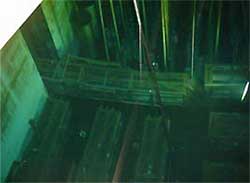
Fuel elements in SFP
Duration: May-July 2007
The maintenance of conventional and radiological safety was achieved by performing the following activities:
• The removal of 300 tonnes crane used for materials handling
• The transfer of AGN-1 cask and accessories from Trino NPP
• The restoration of grates and rails from SFP Area
• The removal of absorption frames used for moving cask AGN-1.
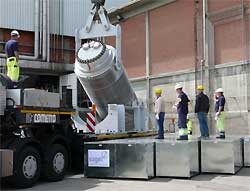
AGN-1 cask loading on trailer
Duration: July 2007
This activity regards the removal of slightly contaminated devices, but not radiating, as for example:
• metallic 'clovers' not removed the previous
year
• quivers containing Trino NPP elements and small baskets
• various devices used in the pool (rods, lamps, television camera)
• foot bridges used for quivers handling during loading fuel
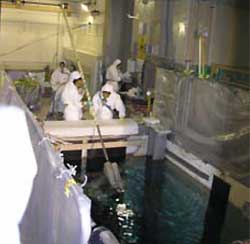
Extraction of metallic 'clovers'
All the activities were performed according to operative procedures for fuel handling and radiation protection.
In particular, the phases involved in managing the waste were:
• the washing of waste in SFP Area
• the removal of waste from SFP Area
• the allocation of waste into appropriate containers
• the transfer to waste to the waste treatment company
Duration: September-November 2007
This activity was the most relevant because it concerned the removal from the SFP of radiating components, such as the headstock MTR (Material Testing Reactors) elements and the magnox capsule.
An Operational Plan was written for the Italian Safety Authority and appropriate shielding and handling frames were designed in order to respect all the laws and regulations for transport and radiation protection.
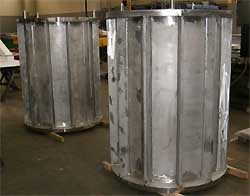
Shielded containers for activated Headstock
MTR
Duration: December 2007; 1 week.
These activities were performed by NUKEM Technology GmbH and ENERGY SOLUTIONS and consisted of the following phases of operational cleaning:
the extraction of various devices from the pool and radiological cleaning and packaging
the sucking out of waste and sludge from the pool bottom
sediment materials recovery from the bottom and the walls of the pool

SIS removal
Duration: November 2007- February 2008; 2 months.
This step consisted of removing and cleaning of plant components and frames that require special disassembly, for example the safety hydraulic System (SIS), the SFP bottom grids, pipes and metallic parts.
Duration: March 2008: 2 weeks.
The purification of the SFP water was performed by two different techniques:
The Wall & Floor WasherTM technique, by
NUKEM/ Energy Solutionsn, an outsourced service
An underwater cleaning system was used to remove contaminated sludge from
the EUREX SFP bottom: about 50 GBq of fission products and transuranic
sludge were recovered.
The Electrocoagulation process, called the SAFETM SYSTEM,
by Energy Solutions, an outsourced service
The water treatment was performed using ElectroCoagulation coupled with
ultra-filtration and final polishing with ionic exchange resins. Water
flow gets through the cells of the system and three chemical processes
occur: coagulation, oxidation and aeration.
Inside the ElectroCoagulation Unit (container ISO 20’) there are
components for water treatment (settling, sludge and feed tanks) that allow
the separation of the sludge from the water.
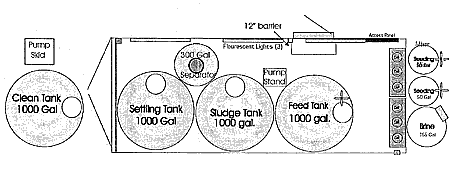
Internal Layout EC System
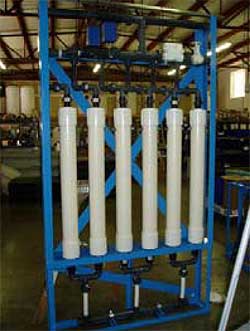
EC cells
Duration: March – June 2008: 4 months.
After accurate radiological monitoring (more than one hundred samples were analysed), water was gradually drained and transferred from the pool to the waste pond (a 1000 m3 external basin).
Surface radiological contamination was limited to pool walls by using specialised painting.
The final water downloading into the nearby Dora river required prior documentation presented to the Italian Safety Authority in order to justify the release levels.
Duration: June 2008: 1 month
Additional steps are scheduled for the following activities:
A SURVEY OF THE CONTAMINATION LEVEL OF THE ANNULAR SPACE
Radiological characterisation of the annular space, pool frames and ground
below the pool will be carried out
THE CONDITIONING AND TREATMENT OF WASTE ACTIVITIES
An outsourced service for the conditioning and treatment of waste, in particular
sludge and resins, will be used.
![]()
© European Nuclear Society, 2008